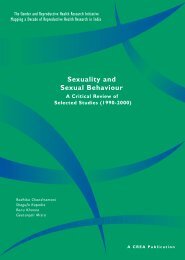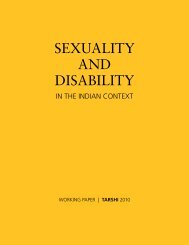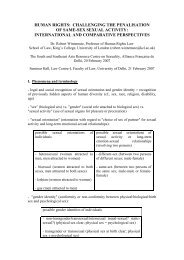People with Disabilities in India: From Commitment to Outcomes
People with Disabilities in India: From Commitment to Outcomes
People with Disabilities in India: From Commitment to Outcomes
You also want an ePaper? Increase the reach of your titles
YUMPU automatically turns print PDFs into web optimized ePapers that Google loves.
7.28 There is little detailed analysis of the performance of the Commissioner system outside<br />
its own reports. However, the most recent GoI report suggests significant issues of low<br />
capacity <strong>to</strong> perform their mandate effectively. CAG evidence for the period 1999-2003 <strong>in</strong>dicates<br />
several concerns related <strong>to</strong>: (i) poor moni<strong>to</strong>r<strong>in</strong>g of use of funds; (ii) lack of clarity on grievance<br />
redressal mechanisms; and (iii) limited advocacy work <strong>in</strong> a number of states. The analysis po<strong>in</strong>ts<br />
<strong>to</strong> significant issues <strong>with</strong> lack of staff and low capacity <strong>in</strong> Commissioners’ offices. These<br />
concerns are supported by field work for this report <strong>in</strong> Rajasthan and Karnataka (two states<br />
considered <strong>to</strong> have better function<strong>in</strong>g offices), which found skeletal staff <strong>in</strong> both offices. In<br />
Rajasthan, the Commissioners’ office consisted of one Additional Commissioner (there has been<br />
no Commissioner s<strong>in</strong>ce end-2003) and his PA, <strong>with</strong> no support staff. The office had failed <strong>to</strong><br />
register any grievance cases of PWD s<strong>in</strong>ce 2002. The same study also noted that full time<br />
Commissioners exist <strong>to</strong> date only <strong>in</strong> a m<strong>in</strong>ority of states. 193 An additional generic concern is the<br />
lack of legal expertise <strong>in</strong> the Commissioners’ offices, particularly at state level, despite the<br />
importance of their quasi-judicial role <strong>in</strong> enforcement of the Act.<br />
7.29 Beneath the state level, the nodal function <strong>in</strong> disability tends <strong>to</strong> be an additional charge<br />
for District or Additional Collec<strong>to</strong>rs and BDOs. These act as <strong>in</strong>itial po<strong>in</strong>ts of grievance redressal<br />
for PWD. Apart from these additional charges, states vary significantly <strong>in</strong> whether or not<br />
dedicated staff exist at lower levels who are specifically dedicated <strong>to</strong> PWD issues. For example,<br />
<strong>in</strong> Karnataka, there are District Disability Welfare Officers, while these are not present <strong>in</strong><br />
Rajasthan. Essentially, dedicated official functionaries cease at best at district level, below which<br />
additional charges are the mode of oversight and service delivery.<br />
7.30 Karnataka has been one of the more active commissioners’ offices, and has piloted a<br />
number of <strong>in</strong>itiatives, for which is has been recognized as the model state for implementation of<br />
the PWD Act. This is despite the office be<strong>in</strong>g subject <strong>to</strong> similar resource constra<strong>in</strong>ts as many<br />
others. The dist<strong>in</strong>ctive feature of the Commissioners’ office <strong>in</strong> Karnataka is that is has carved out<br />
a role which is somewhat <strong>in</strong>dependent of the state Social Welfare Department. Some of the<br />
<strong>in</strong>novative features of the operation of the Karnataka office are presented <strong>in</strong> Box 7.3.<br />
7.31 A further significant <strong>in</strong>stitution <strong>in</strong> the disability field is the National Trust For Persons<br />
<strong>with</strong> Autism, Cerebral Palsy, Mental Retardation and Multiple Disability. Its objectives are <strong>to</strong>: (i)<br />
enable and empower persons <strong>with</strong> disability <strong>to</strong> live as <strong>in</strong>dependently and as fully as possible <strong>with</strong><strong>in</strong> and as<br />
close <strong>to</strong> the community <strong>to</strong> which they belong; (ii) strengthen facilities <strong>to</strong> provide support <strong>to</strong> persons <strong>with</strong><br />
disability <strong>to</strong> live <strong>with</strong><strong>in</strong> their own families; (iii) extend support <strong>to</strong> registered organizations <strong>to</strong> provide need<br />
based services dur<strong>in</strong>g the period of crisis <strong>in</strong> the family of persons <strong>with</strong> disability; (iv) deal <strong>with</strong> problems<br />
of persons <strong>with</strong> disability who do not have family support; (v) promote measures for the care and<br />
protection of persons <strong>with</strong> disability <strong>in</strong> the event of death of their parent or guardian, <strong>in</strong>clud<strong>in</strong>g evolv<strong>in</strong>g<br />
procedures for appo<strong>in</strong>tment of guardians and trustees for persons <strong>with</strong> disability requir<strong>in</strong>g such protection.<br />
7.32 (b) The miss<strong>in</strong>g pieces – PRIs and disability: As noted <strong>in</strong> the policy section<br />
above, PRIs are largely absent <strong>in</strong> public sec<strong>to</strong>r disability policy and practice. This results <strong>in</strong> an<br />
<strong>in</strong>stitutional framework for disability which is <strong>in</strong>creas<strong>in</strong>gly out of l<strong>in</strong>e <strong>with</strong> the constitutionallymandated<br />
developments <strong>in</strong> decentralization of service delivery and oversight. The relative lack<br />
of attention <strong>to</strong> PRIs cont<strong>in</strong>ues <strong>in</strong> the National Policy. In addition, the field work <strong>in</strong> rural UP and<br />
TN for this report revealed that panchayat officials were generally just as ignorant as the rest of<br />
the community, not only on the entitlements of PWD, but also <strong>in</strong> terms of knowledge about<br />
causes of disability and attitudes <strong>to</strong> PWD. An important <strong>in</strong>itial step of an <strong>in</strong>stitutional strategy for<br />
<strong>in</strong>tegrat<strong>in</strong>g PRIs <strong>in</strong><strong>to</strong> the disability <strong>in</strong>stitutional framework would thus be <strong>in</strong>clud<strong>in</strong>g disability<br />
sensitization <strong>in</strong> the general tra<strong>in</strong><strong>in</strong>g courses which PRI officials will undertake <strong>in</strong> com<strong>in</strong>g years.<br />
193 Bhambani (2006).<br />
-134-










